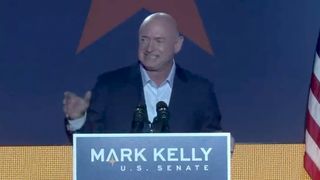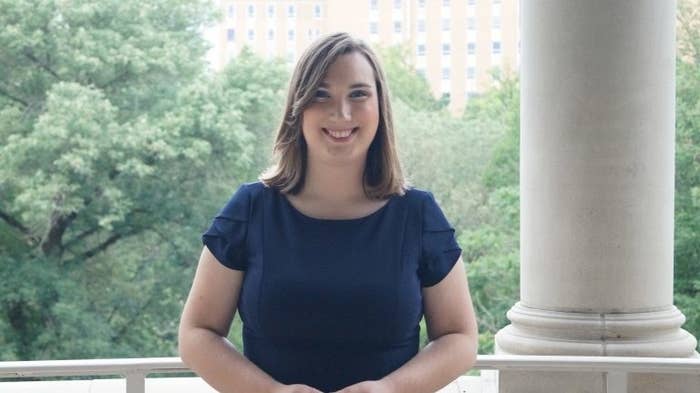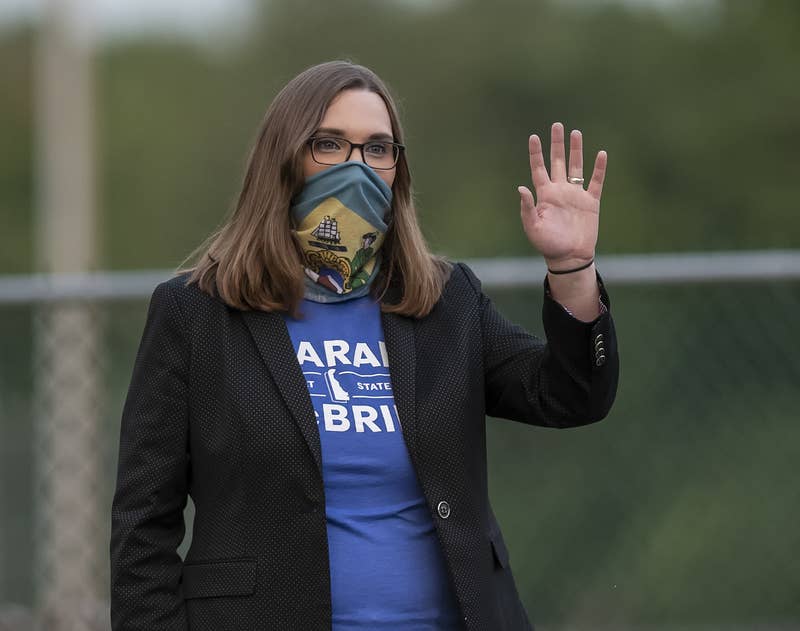Mark Kelly becomes 4th astronaut elected to Congress
By Robert Z. Pearlman - collectSPACE.com Editor

Former NASA astronaut Mark Kelly, seen addressing supporters on Tuesday night (Nov. 3) in Tucson, has been elected by the state of Arizona to the U.S. Senate. Kelly is the fourth astronaut to secure a seat in Congress.
(Image: © Mark Kelly)
Mark Kelly has won a seat in the U.S. Senate, making him only the fourth NASA astronaut to be elected to Congress.
Kelly, who launched four times into space before pursuing a career in politics, was successful in his bid to represent the state of Arizona in the U.S. Senate. Kelly, a Democrat, ran against incumbent Martha McSally, a Republican and former U.S. Air Force combat pilot. The special election was held to complete the six-year term of Senator John McCain, who died in 2018 (McSally was temporarily appointed by Arizona's governor after McCain's death).
"When we launched this campaign from this very spot, right here, 619 days ago, I could have never anticipated just how many Arizonians would be part of this mission," said Kelly, addressing supporters at the Hotel Congress in Tucson on Tuesday night (Nov. 3). "This mission does not end when the last vote is counted. It is only the beginning."
Kelly won the election by a margin of 52.63 percent, according to the Secretary of State for the state of Arizona.
Related: What the 2020 presidential election mean for space exploration
"When I was at NASA, we would train for two years for a space shuttle mission. From being in the space shuttle simulator and flying and training, two years of focusing on the details. Two years before we were on the launchpad ready to go. And then the work started," he said. "Now the work starts."
Kelly, who is married to former Arizona Congresswoman Gabby Giffords, moved to Tucson in 2012 after he retired from NASA and Giffords survived an assassination attempt the year earlier. Together, the couple co-founded "Giffords" to advocate for reduced gun violence and to help make communities safer.
Kelly could possibly take office as soon as the end of the month, pending the state certifying the results of the election. When he is sworn in, Kelly will become the only active member of Congress who has flown in space. He is preceded in the legislative branch of the U.S. government by three former NASA astronauts and two members of Congress who flew on the space shuttle as payload specialists.
How astronauts vote from space: The only American in orbit now explain

Kelly, a former captain in the U.S. Navy, a naval aviator and test pilot who flew combat missions in Operation Desert Storm, was selected for NASA's 1996 class of astronaut candidates — the same group that included his twin brother, Scott.
Kelly logged more than 54 days in space on four shuttle missions. He served as the pilot on his first flight, STS-108, launching on the space shuttle Endeavour to deliver supplies to the International Space Station in 2001. Five years later, Kelly flew as pilot of the shuttle Discovery on STS-121, NASA's second return-to-flight mission after the loss of the orbiter Columbia and its crew in 2003.
Kelly commanded Discovery's STS-124 crew in 2008, which installed Japan's Kibo laboratory on the space station. His fourth and final mission, STS-134, marked the last flight of Endeavour and delivered the Alpha Magnetic Spectrometer, a cosmic ray detector, to be mounted to the station's backbone truss.
After leaving NASA, Kelly volunteered for one more "mission," allowing the agency's scientists to collect his physiological and medical data while his brother provided the same during a year aboard the space station. The landmark "twins study" helped further reveal the effects that long-duration space travel has on the human body.
Related: Presidential Visions for Space: From Ike to Trump
Science + data + facts
Mark Kelly for U.S. Senate campaign buttons. (Image credit: Mark Kelly)
The first astronaut to trade his spacecraft couch for a seat in Congress was John Glenn, the first American to orbit Earth. One of the original Mercury 7 astronauts, Glenn served as a U.S. Senator representing the state of Ohio as a Democrat for four terms, from 1974 to 1999. After leaving office, Glenn, then 77, flew into orbit again, launching on space shuttle Discovery as a payload specialist.
Apollo 13 command module pilot John "Jack" Swigert was elected to the U.S. House of Representatives representing Colorado's 6th district as a Republican in 1982, but tragically died of cancer before he could take office.
Apollo 17 lunar module pilot Harrison "Jack" Schmitt followed up being one of the two last people to walk on the moon in 1972 by serving the state of New Mexico in the Senate as a Republican for six years, from 1977 to 1983.
Following the opposite path, Senator Jake Garn (R-UT) and Representative Bill Nelson (D-FL) were chosen to fly on the space shuttle as congressional observers and payload specialists at a time when NASA was working towards opening up spaceflight to "citizen" passengers. Garn joined the STS-51D crew on Discovery for a week-long mission to deploy two communications satellites in 1985.
Nelson, who later was elected to the Senate, flew on Columbia with the STS-61C crew. The six-day mission, which was the last to fly before the shuttle Challenger tragedy, deployed a satellite and conducted science in 1986.
In addition to those five space explorers and Kelly, four other U.S. astronauts ran for Congress, but were unsuccessful in their bids.
Apollo 15 command module pilot Al Worden campaigned for but lost the Republican primary for Florida's 12th district seat in the House of Representatives in 1982. Skylab and space shuttle crew member Jack Lousma won the Republican primary, but lost the election to be a senator from Michigan in 1984.
Jay Buckey, who flew as an STS-90 payload specialist on Columbia, withdrew his bid for a New Hampshire Senate seat prior to the Democratic primary in 2008. Two years later, STS-128 mission specialist José Hernández won the Democratic nomination but lost the election for California's 10th district seat in the House of Representatives.



















